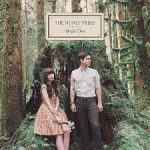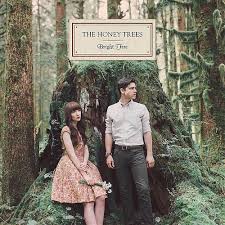
Thanks to the Internet, sharing and discovering music becomes easier with every new social media development. However, for musicians, the hoards of new bands and artists that emerge onto the scene every single day make discovery almost impossible. Because of the fast pace of the industry, musicians are pressured to churn out new albums, singles, and music videos as quickly as possible in order to grasp success before it passes. Relevancy is fleeting even for big names, so for indie musicians, competing with pop singers who are worth millions is a daunting task, and the pressure often results in rushed, subpar releases despite having great strong debut material. However, The Honey Trees took a different approach to the release of their debut album. The band is comprised of Becky Filip and Jacob Wick, and the four years it took them to write and record Bright Fire certainly paid off, as the album is an intricate, heartfelt, and magical gem that proves slow and steady truly does win the race.
The opening track, “By The River,” demonstrates the duo’s unique ability to combine modern sounding music with a nostalgic twist. The song, much like the rest of the album, is equally dreamy and serious, with a tone that is reminiscent of fairy tales while still being very much grown up. “Still I Try,” one of the strongest songs on the album, puts Wick’s vocals on display, and the sweeping orchestral instrumentals compliment the simple lyrics such as “I kiss to change your mind, but I lose you every time.” Loss is a prevalent theme throughout the album despite the constant feeling of wonderment. In “Siren,” Wick recalls someone who “ran away to another land,” and although the Wick “chose to stay and wait for [her] return,” “time has gone to pass [them] by;” similarly, “Ammon’s Horn” is a gentle track deals with Wick’s reflection regarding someone who “[calls him] back to the memories” of their relationship but he still “can’t let [her] go.” “The Seaside” starts off as a soft, piano-driven ballad, but slowly builds to an emotional climax. Throughout the song, Filip laments a person who “[was] brave but lost it all” and begs them to stay.
Although much of the album is soft and tender, it is far from boring. The songs never rely on one style (such as acoustic guitar or piano); instead, the album utilizes a combination of different sounds from horns to synthesizers to just Filip’s vocal tracks replacing typical instruments in “Wild Winds.” “The Fall” starts off slow, but once it reaches the first chorus, it builds up to a catchy but dynamic peak. The dreamy quality throughout the album is never overbearing or redundant, and the songs all stand out individually instead of blending into a hazy, whimsical mess. While “Like a Thousand Stars” and “Nightingale” are retro and electric-guitar driven, “Ours” is a sweet and sentimental piano ballad, and “Golden Crown” is an understated track that relies on simple instrumentals and Filip’s sweet vocals.
The genuine passion and love that Filip and Wick have for music is refreshing in a time where music is frequently disposable, and the complexity of the album sets it apart from the often weak self-released albums that indie artists are forced to produce themselves. And even though the band’s sound draws parallels between similar bands such as Eisley and The Hush Sound, they have a unique sound unlike any other in the indie scene. With the release of their debut album, The Honey Trees are reminding pessimists that good music is still out there if audiences are willing to look beneath the Billboard Top 100.









